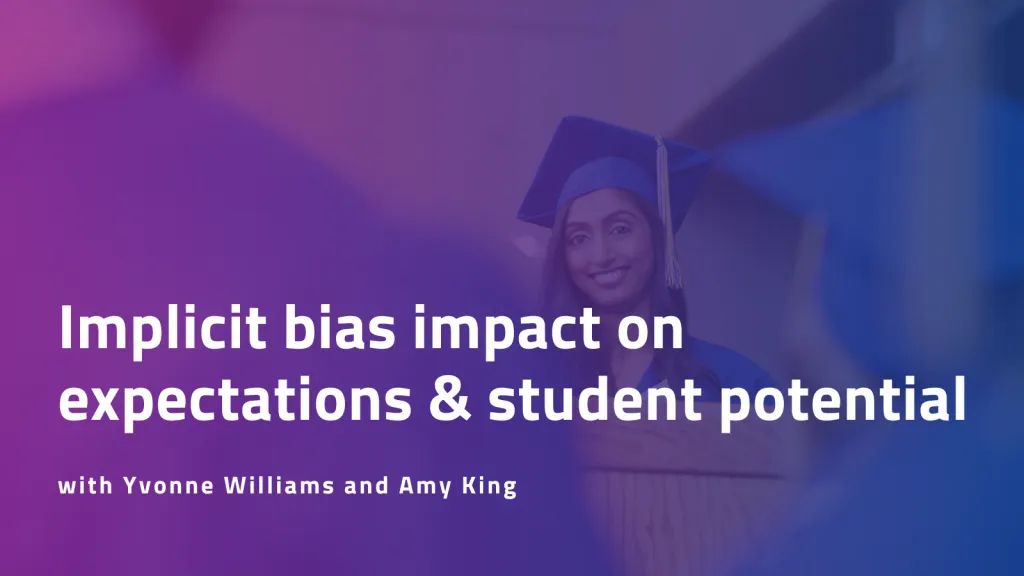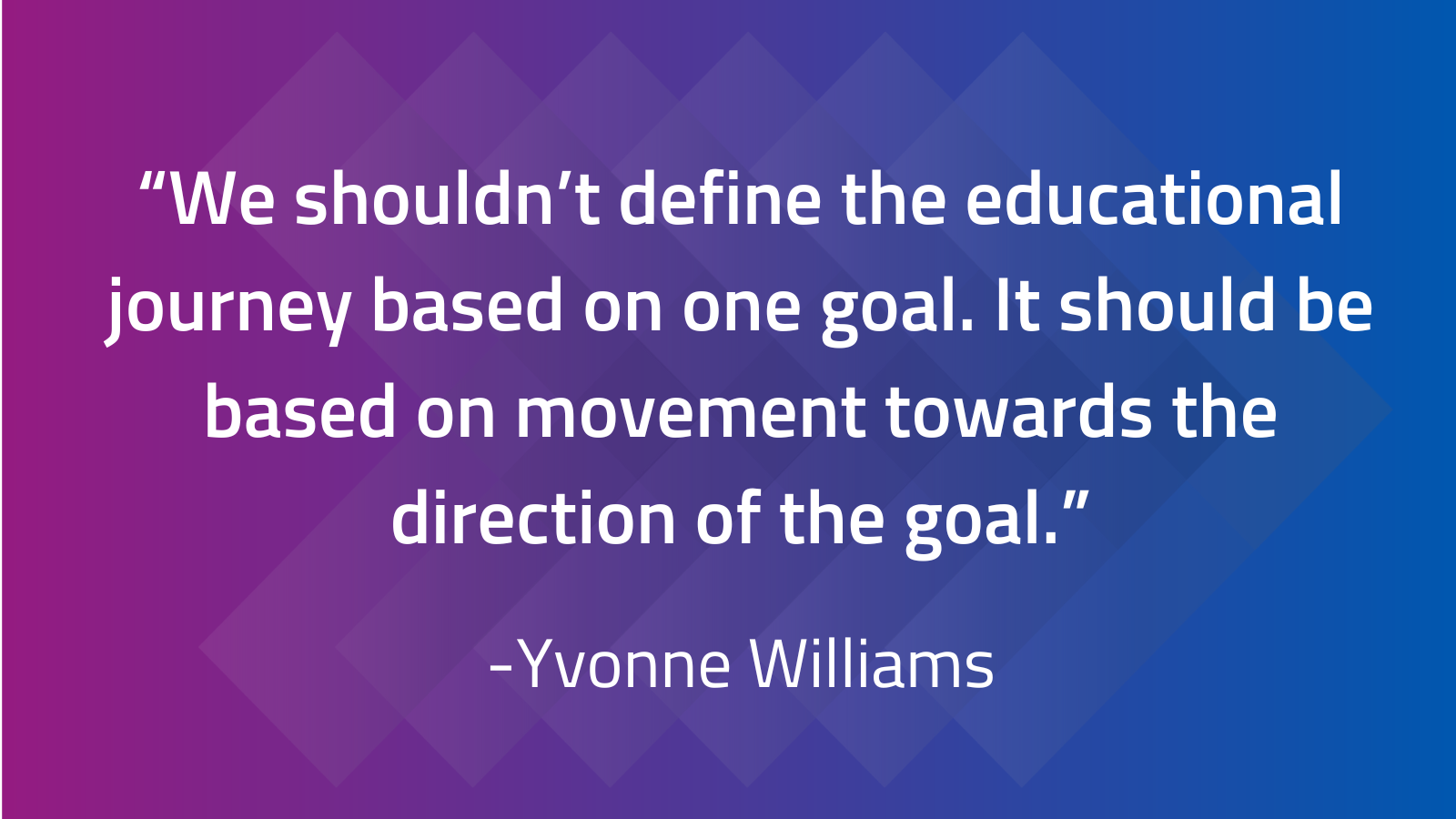Addressing limiting beliefs & implicit bias in education


Addressing limiting beliefs & implicit bias in education
Implicit bias, a negative attitude of which one is not consciously aware, against a specific social group, shows up in every profession - including education. For English learners, who have experienced a long history of explicit bias in the education system, this is a very real threat to their educational opportunities and achievement. When educators hold unconscious stereotypes about these students' abilities, it can lead to lowered expectation.
Moreover, this bias can erode students' self-esteem and sense of belonging, further impeding their educational journey. Addressing and dismantling such bias is essential to ensuring equitable access to quality education for all students, regardless of their language background.
We spoke with Amy King and Yvonne Williams from WCEPS about this topic on our latest Highest Aspirations podcast episode. Listen to the full conversation there, and find key takeaways and highlights from the conversation below:
Impact of expectations on potential
We’ve had several conversations with our EL Community in the past about the impact that labels can have on students as well as the educators who teach them. One of the biggest risks is that by assigning a certain label to a subgroup of students, we are subconsciously assigning them a different set of expectations and beliefs about what they can achieve.
“There's some that have interrupted schooling, there's some that have a lot of schooling, there's some that come from an Indigenous area of their country, there are refugees. So to lump up and say newcomer or ELL is the starting place for the mistakes that we're making because we need to identify who these students are before we place a label on them,” Williams explains.
Another leading factor in the mismatch of the expectations we have for our language learners and their full potential is an idea commonly called the “pobrecito syndrome,” where educators lower their expectations for students that they believe to be disadvantaged in some way to avoid adding additional stress or frustration.
“When we're working with a group of students that we know we are trying to empower to learn and acquire a second language, we fall trapped to the idea that we're there to protect them and support them. Then there’s the fact that as teachers, in our hearts, we want to teach. And if we don't see it happening in the moment… then we will do just enough so that we see that they are happy in the progress that they're making, instead of really thinking about what is the potential that we're trying to get them to meet,” says Williams.
While it may come from an empathetic or caring place, lowering our expectations for our students is only harming them in the long run. Instead, King and Williams encourage changing our approach to instruction, rather than our expectations.
“It’s about mindset and thinking about ways that we can be intentional in our planning to challenge students cognitively, but reduce the language demand…It’s also important to recognize that English proficiency is not a measure of IQ or cognitive ability,” shares King.
Productive struggle vs. pushing past their frustration point
While it is important to maintain high expectations for our language learners and encourage them to reach their full potential, there is also a risk of overcorrecting. If teachers push students beyond their productive struggle zone, they can become frustrated and shut down or can no longer be successful.
King and Williams believe that the best way to prevent this from happening is through relationship building and creating a safe environment where students can advocate for themselves.
“I think that so much of that has to do with building relationships with students and really getting to know them. Giving students space to feel comfortable in sharing with you when you have pushed them too far,” shares King.
“One of the most important pieces, in my opinion, is the self-advocacy of students or self-regulation of learning where they're able to communicate,” Williams continues. “Students who don’t feel that they’re able to be successful will give up. Everyone has their own journey, but we need to provide them the opportunity to advocate for themselves and tell us what they need to learn.”

Addressing & decreasing implicit bias
The first step to addressing implicit bias is to acknowledge that we all have them, and rather than judging ourselves and others for this, putting together a plan for accountability.
“I think sometimes we like to pretend that we don't because we think it labels us as racist or bigots in some way or another. But for me, I've done some reading and some work and have my allies who I can count on to check me if I say something that comes out that illustrates that implicit bias. I also think a lot of it just has to do with monitoring my own thoughts and the way I think about things. I try taking a breath before I say something out loud and process it that way,” King suggests.
There are also steps educators can take to decrease the impact that this implicit bias has on their students. King and Williams share that although there is a commonly held belief that data cannot be biased, there are many ways of collecting and analyzing data where bias can become a significant factor.
“If we think about quantitative data, we're thinking, "It's numbers, it's numbers. Numbers don't lie. We can sort this and we can sort students by that." But we fail sometimes to think about what data am I looking at? What bias am I bringing in when I'm looking at this data? And how is that influencing the way I'm analyzing the data?” explains King. “I think about teachers who make data walls with students color coded and grouped, but they didn't think about the whole child, and were using this quantitative data to make decisions about what kind of additional services students got without really thinking about the students themselves and what they really needed.”
Confirmation bias plays a big role in interpreting data as well, which essentially means looking at data to satisfy a certain idea you already have. Williams shares a great strategy for decreasing the risk of this:
“We have a slide [in a PD session] and we ask teachers, ‘What would you recommend for the families of this student versus this student?’ And we include qualitative and quantitative data, and they had very different responses for both students - and it was the same student. So we just wanted them to see how sometimes that comes into play when you're looking at data, and it's so important for us to step back and consider removing the name so that we can really think about what it is that we're looking for and at?”
A final piece of advice from King and Williams was around encouraging students, whose self esteem and beliefs around their own abilities could have been impacted by others’ biases over the years, to maintain a growth mindset.
“I often say, it's almost like a marathon. I can run the marathon - not as fast as somebody that trains, but I can complete it. And the same message is if I had the training, the time, and the experience, I could also run it as fast as the person that's running it. So how are we communicating that to students back to that individual journey? Because everybody has that journey and everybody moves at a different pace and has different visions for their future,” shares Williams.
“ It’s the ‘small but mighty.’ And getting students to start thinking that I'm on a path, I'm on a journey.I think even small things like greeting students as they come in, "I'm glad you're here," that I think over time can build the emotions in the student or that sense that I do care about you,” adds King. “And that may help them break out of that cycle of feeling like they're not enough or that they don't have aspirations - that I as a teacher might help support them in meeting or achieving.”
Download the full episode transcript and visit the WCEPS website to learn more about the work King and Williams do.
Yvonne is the Director of Multilingual Learner Educator Engagement at WCEPS. She collaborates closely with LEAs to discuss educator goals and needs to develop the best path to topics that align with those goals. Prior to WCEPS, she spent three years with WIDA, as a Professional Learning Specialist working in both international and domestic settings. She has worked in education for 25+ years, teaching a variety of language learners from grades Kinder to High School. She also worked as a District ELL Trainer, ELL Instructional Coach, Family Literacy Coordinator, and High School Parent Involvement Coordinator. Yvonne was born in Chihuahua Chihuahua Mexico and came to the US when she was 5. Her experience as an English language learner adds passion to her work. She is joined by her two sisters as first-generation graduates with a master's degree. Her journey as an EL student has provided her with insights that promote high expectations, recognizing potential and leveraging the cultural assets that bilingual students bring to school communities. She now lives in Washington State with her husband but lived in Las Vegas, Nevada for over 23 years prior to moving to Washington. Her two bi-racial sons are proud to hold bachelor's degrees and live in Nevada and Washington states. She believes in family first and values the value that public education can provide for all students. She earned her bachelor’s in business administration from Angelo State University in Texas and her Master's in Bilingual Education from NOVA Southeastern University, Florida. Her endorsements include TESL, Bilingual, and Computer Literacy.
Amy King has more than 20 years of experience in the field of English language teaching and learning both in the US and overseas. Before joining WCEPS, Ms. King was a Senior Professional Learning Specialist at WIDA for more than six years. She taught ESL in K–12 public schools, private language schools, and adult education programs. Internationally, she has taught in both Slovakia and South Korea. In Banska Bystrica, she was a visiting lecturer at Mateja Bela University. In Seoul, she worked at Shin–il High School as a Fulbright English Teaching Assistant and at the Foreign Language Institute of Yonsei University. She was an English Language Fellow at Hanoi Metropolitan University in Vietnam through a program sponsored by the US State Department. She holds a BS in Speech and an MS in Journalism from Northwestern University near Chicago. She earned a TESOL Certificate from American University in Washington, DC and a Multiple–Subject Teaching Credential from National University in San Diego. In addition to certificates in Blended Learning, Microlearning and E–Learning, she earned a Master of Instructional Design from the Association of Talent Development. She is currently working on a MS in Educational and Instructional Technology through National University.